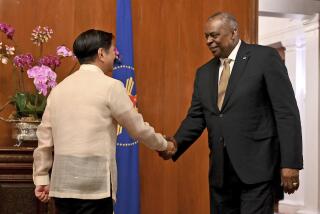Marcos on the Philippines
- Share via
I must agree with Marcos that prior to 1986 U.S.-Philippine relations were conceived as “mutually beneficial predicated on shared interests.” The interests of the United States in the Philippines during the era of Marcos’ rule were indeed beneficial to the United States. However, the Philippine interests were never really beneficial to the Filipino people. Marcos, however, benefited greatly from these interests.
Marcos claims the new Philippine government is ignoring the nation’s needs, and has turned to more “adversarial” relations with the United States. These relations, however adversarial they may be, may have been spurred by what the U.S. foreign policy was towards the Philippines prior to 1986. Has the U.S. exploited the Philippines, if not since the turn of the century, since 1965? Many dispute this question, but the fact is under Marcos’ rule the Philippines withered from the No. 2 exporting nation in Southeast Asia (second only to Japan) to one of the most economically depressed countries in the region. And the United States supported Marcos to the day he was deposed.
It is good to note that there exists in the Philippine government some factions which are convinced that the U.S. has exploited the Philippines. These leaders are well able to utilize a system of checks and balances (absent in the last government) to further help in the stabilization of this young democracy.
The U.S. military presence in the region does ensure to an extent peace and stability for the Four Tigers who have been able to become an economic force in the region. On the contrary however, the military presence has not assured peace and stability in the very country where these major U.S. installations reside and Marcos for some reason has failed to grasp this fact.
It is sad to note that the communist insurgents (created in 1968) are waging their war against the government primarily with U.S. weapons. They receive no outside support, and with the current negotiations with the Soviet Union, China, and the United States, will more than likely receive no support in the near future.
It’s evident that corruption and old-style politics prevail in this island nation. Marcos had his chance to turn the Philippines towards a stronger independence, and judging by the events of early 1986, has came up short in doing so.
Aquino and her cabinet, however “vindictive” they may be, are now blessed with the opportunity to prove to the people of the Philippines, and of the world, that democracy can blossom in the Philippines.
J. BAUTISTA VIRATA
Westminster
More to Read
Sign up for Essential California
The most important California stories and recommendations in your inbox every morning.
You may occasionally receive promotional content from the Los Angeles Times.












